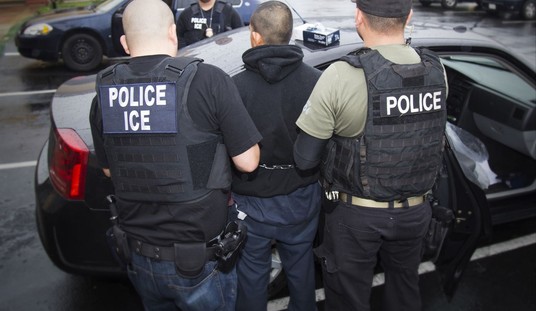Again we see how the worst of times can sometimes bring out the best in people. The latest example is that of Awad Darawshe, an Arab Israeli who gave his life aiding those wounded in the treacherous Hamas attack on Israel on October 7th.
When Hamas unleashed its attack on thousands of Jews attending a music festival in southern Israel earlier this month, an Israeli Arab paramedic insisted on staying at the scene to try to save lives.
In the end, he gave his own.
Awad Darawshe was 23, single, handsome — but he wasn’t at the Tribe of Nova festival to dance. He worked for Yossi Ambulances and was among a team of paramedics assigned to work the festival in a tent on the site’s periphery.
He was killed when Hamas militants slipped undetected into Israel from the Gaza Strip and butchered their way through the festival crowd and into nearby villages, settlements and kibbutzim.
The AP is mute as to Mr. Darawshe's religion, and the name "Awad" (sometimes spelled "Awwad") is common among both Muslims and Christians in the region. The name, when used as a given name, carries the meaning "reverence" or "kindness" and proved, in this case, to be very apt. Mr. Darawshe's cousin, who gave a statement later in the article, is named Mohammed, which one would think would imply a Muslim family; again, AP does not say. But that's not really germane; what is relevant is Awad Darawshe's heroism.
Shortly after dawn on Oct. 7, rockets pierced the skies. Grenades went off. Gunfire ricocheted everywhere. Injured, bleeding revelers raced to the paramedics’ station. But the chaos quickly escalated. As the scope of the Hamas attack became clear, the station’s leader ordered the paramedics to evacuate.
Darawshe refused to leave. He was shot to death while bandaging one of the injured.Days later, after his body was identified, the surviving paramedics told Darawshe’s family why he had chosen to stay. He felt that, as an Arab, he could somehow mediate with the attackers.
"He said, ‘No, I’m not leaving. I speak Arabic, I think I can manage,’” said his cousin, Mohammad Darawshe, who spoke to The Associated Press by telephone from his home in northern Israel.
That fateful decision has left the Darawshe family reeling with sorrow, their only comfort the bravery of Awad’s actions.
“He brought us a lot of pain, he brought us a lot of agony, he brought us a lot of sorrow,” his cousin said. “But he also brought us a lot of pride — because he chose to stay with his mission until the last moment.”
In doing this, Awad Darawshe lived up to the highest standards of emergency medicine: You're there for the patient. Always the patient. In my Army service, I was initially trained as a Company Aidman and assigned to an Infantry battalion; in that training, we were told, again and again, that you take care of the wounded, no matter who they are, and you stay with and protect your patients.
That's what Mr. Darawshe did, heroically and without regard for his own safety, until the vicious animals of Hamas cut him down - an Arab, an Israeli Arab, caring for Israeli Jews and Europeans alike.
Mr. Darawashe's cousin Mohammed rightly lauded Awad's heroism in a statement:
Darawshe’s death was confirmed by the Israeli Foreign Ministry in social media posts, which said Hamas not only killed Darawshe but stole his ambulance and drove it to Gaza.
“A hero,” the Foreign Ministry said of Darawshe. “May his memory be a blessing.”
Mohammad Darawshe is the director of strategy at the Givat Haviva Center for Shared Society, an organization that works to bridge the gap between Israel’s Jewish and Arab citizens — the ethos of the Darawshe family for which Awad made the ultimate sacrifice.
“We are very proud of his actions,” Mohammad Darawshe said. “This is what we would expect from him and what we expect from everyone in our family — to be human, to stay human and to die human.”
Yes, may his memory be a blessing, but let it also be an example. This war will go on and things will very probably get worse before they get better. There have been acts of savagery, and there will likely be more. War is horror, and we're going to see horror in the Middle East over the next few weeks or months.
But every war ends. This one will, hopefully, end with victory for Israel. But let it also end with the memory and principles of Awad Darawshe; his sacrifice must be remembered, lest it be in vain.
In his 1867 edition of his collection Leaves of Grass, Walt Whitman wrote of the Wound-Dresser:
Bearing the bandages, water and sponge,
Straight and swift to my wounded I go,
Where they lie on the ground after the battle brought in,
Where their priceless blood reddens the grass, the ground,
Or to the rows of the hospital tent, or under the roof’d hospital,
To the long rows of cots up and down each side I return,
To each and all one after another I draw near, not one do I miss,
An attendant follows holding a tray, he carries a refuse pail,
Soon to be fill’d with clotted rags and blood, emptied, and fill’d again.
I onward go, I stop,
With hinged knees and steady hand to dress wounds,
I am firm with each, the pangs are sharp yet unavoidable,
One turns to me his appealing eyes—poor boy! I never knew you,
Yet I think I could not refuse this moment to die for you, if that would save you.
Awad Darawshe did die, and while his death did not save the wounded he treated, perhaps he can serve as an example not of what humanity is but of what it can be. In that, his refusal at that moment to die for the wounded he was treating may well save many.














